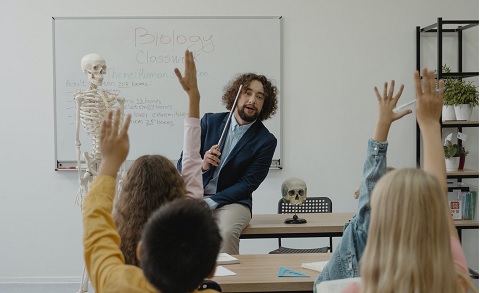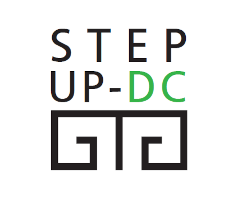Session 5, Education Engagement and Participation
STEPUP-DC Project

Course DescriptionBasic Topics
- Degrees and kinds of youth/children’s participation in schools
- Purposes of schooling and conceptions of youth participation
- Youth participation, forms of citizenship and democracy
- Pedagogical strategies for promoting political participation
- School as a community: developing whole school approaches
Duration
The duration of the session is 9 hours (3 reading + 3 learning + 3 working/practicing)
Objectives
The Objectives of this session are:
- Familiarise students with current debates in pupils’ participation in education (including classroom participation, participation in learning, and participation in school governance).
- Support students in developing a critical understanding of the concept of pupils’ voice, particularly examined in the context of formal education.
- Engage students in critical explorations of the role of teachers in democratic pedagogies, including the whole school approach.
Learning outcomes
After completion of the session students will:
- Understand different forms of youth/ children’s participation in schools and society and links with democracy.
- Describe and critically reflect upon the different purposes of schooling and related conceptions of youth participation.
- Identify pedagogical strategies to promote youth/children’s political participation, including through the whole school approach.
- Brief reflective essay on the reconceptualists and post-reconceptualists and the purposes of schooling.
- Fully developed classroom strategy on the completion of the workshop that promotes students’ social and/or political participation.
Outcomes and CDC
- Knowledge and critical understanding
- Including politics, law, human rights, cultures, religion, etc.
- 117: Can explain the meaning of basic political concepts, including democracy, freedom, citizenship, rights and responsibilities (basic)
- Values
- Valuing democracy, justice, fairness, equality and the rule of law
- 301: Argues that schools should teach students about democracy and how to act as a democratic citizen (basic)
- Attitudes
- Civic Mindedness
- 602: Collaborates with other people for common interest causes (basic)
- 604: Expresses a willingness to participate in collective decision making (basic/intermediate)
- 607: Expresses an interest in public affairs and issues (intermediate)
- 611: Is actively involved in community issues (intermediate/advanced)
- 613: Participates in decision-making processes regarding the affairs, concerns and common good of the community (intermediate/advanced)
- 614: Exercises the obligations and responsibilities of active citizenship at either the local, national or global level (advanced)
- Skills
- Analytical and Critical Thinking Skills
- 1101: Can identify similarities and differences between new information and what is already known (basic)
- 1110: Can make evaluations on the basis of evidence and experience (basic/intermediate)
- 1111: Can analyse alternative points of view (basic/intermediate)
- 1136: Can evaluate critically the actions of those who have responsibilities to respect, promote and realise human rights
- (intermediate/advanced)
-
- Empathy
- 1302: Expresses sympathy for the bad things that he/she has seen happen to other people (basic)
- 1303: Expresses compassion for people who are being treated unfairly (intermediate)
- 1320: Expresses sympathy for people who are less fortunate than himself/herself (intermediate)
- 1325: Expresses the view that, when he/she thinks about people in other countries, he/she shares their joys and sorrows (advanced)
- Degrees and kinds of youth/children’s participation in schools
- Purposes of schooling and conceptions of youth participation
- Youth participation, forms of citizenship and democracy
- Pedagogical strategies for promoting political participation
- School as a community: developing whole school approaches
The duration of the session is 9 hours (3 reading + 3 learning + 3 working/practicing)
The Objectives of this session are:
- Familiarise students with current debates in pupils’ participation in education (including classroom participation, participation in learning, and participation in school governance).
- Support students in developing a critical understanding of the concept of pupils’ voice, particularly examined in the context of formal education.
- Engage students in critical explorations of the role of teachers in democratic pedagogies, including the whole school approach.
After completion of the session students will:
- Understand different forms of youth/ children’s participation in schools and society and links with democracy.
- Describe and critically reflect upon the different purposes of schooling and related conceptions of youth participation.
- Identify pedagogical strategies to promote youth/children’s political participation, including through the whole school approach.
- Brief reflective essay on the reconceptualists and post-reconceptualists and the purposes of schooling.
- Fully developed classroom strategy on the completion of the workshop that promotes students’ social and/or political participation.
- Knowledge and critical understanding
- Including politics, law, human rights, cultures, religion, etc.
- 117: Can explain the meaning of basic political concepts, including democracy, freedom, citizenship, rights and responsibilities (basic)
- Including politics, law, human rights, cultures, religion, etc.
- Values
- Valuing democracy, justice, fairness, equality and the rule of law
- 301: Argues that schools should teach students about democracy and how to act as a democratic citizen (basic)
- Valuing democracy, justice, fairness, equality and the rule of law
- Attitudes
- Civic Mindedness
- 602: Collaborates with other people for common interest causes (basic)
- 604: Expresses a willingness to participate in collective decision making (basic/intermediate)
- 607: Expresses an interest in public affairs and issues (intermediate)
- 611: Is actively involved in community issues (intermediate/advanced)
- 613: Participates in decision-making processes regarding the affairs, concerns and common good of the community (intermediate/advanced)
- 614: Exercises the obligations and responsibilities of active citizenship at either the local, national or global level (advanced)
- Civic Mindedness
- Skills
- Analytical and Critical Thinking Skills
- 1101: Can identify similarities and differences between new information and what is already known (basic)
- 1110: Can make evaluations on the basis of evidence and experience (basic/intermediate)
- 1111: Can analyse alternative points of view (basic/intermediate)
- 1136: Can evaluate critically the actions of those who have responsibilities to respect, promote and realise human rights
- (intermediate/advanced)
- Analytical and Critical Thinking Skills
-
- Empathy
- 1302: Expresses sympathy for the bad things that he/she has seen happen to other people (basic)
- 1303: Expresses compassion for people who are being treated unfairly (intermediate)
- 1320: Expresses sympathy for people who are less fortunate than himself/herself (intermediate)
- 1325: Expresses the view that, when he/she thinks about people in other countries, he/she shares their joys and sorrows (advanced)
- Empathy
A series of resources that the student teacher must study in this session and a series of additional resources for further study.
A full paper and additional e-lessons on the topics of the session and additional interactive presentation of the materials, for the student teachers to study all the materials in a row.
A series of authentic, up to date and relevant activities with their accompanying materials, which deliver the intended learning outcomes of the session and are carried out face to face or E-learning with groups of student teachers.
Several types of questions to evaluate how much the student teachers have learned throughout the session (reading material, learning material and workshop).
Calendar
Announcements
- - There are no announcements -
